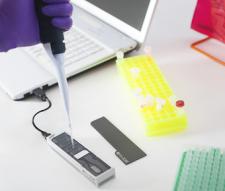Aggregated News

Aboard the International Space Station, six people are currently orbiting the planet at 17,000 miles per hour, taking in fifteen sunrises and sunsets every day. The view is unbeatable; the floating sensation, sublime.
But good luck to them if they get sick.
There’s nothing on board the ISS that can definitively diagnose a disease, or identify the microbes behind it. Instead, sick astronauts have to settle for describing their symptoms to medical staff on the ground. They have no way of knowing for sure if their disease is bacterial, viral, or something else, or if raiding the station’s finite supply of antibiotics would do them any good.
If an astronaut could decipher the full genetic code of whatever’s plaguing her, she could identify the offending bug and work out if it’s vulnerable to any drugs. But until recently, this scenario would have been laughably impractical. Sequencers were all the size and weight of microwaves and fridges. They’d be impossible to cart aboard a space station, and probably wouldn’t have survived the trip.
Thanks to a British company...



